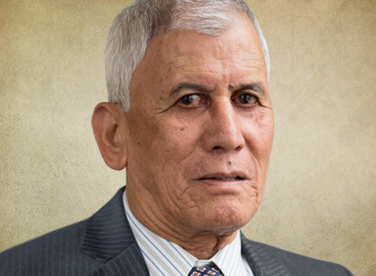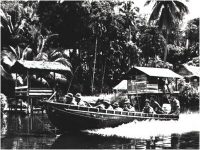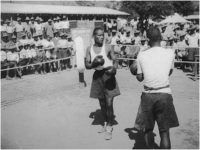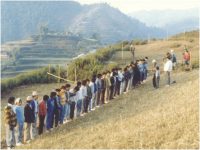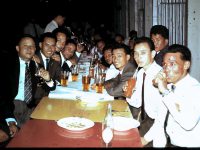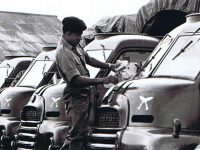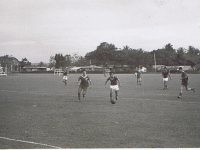Jaman Sing Gurung
Jaman Sing Gurung Rifleman
(Portrait © Gurkha Voices Oral History Project)
-
Example of Jaman's motor boat patrol days
-
Young Gurkha cadets in training
-
Galla Wala recruiting village boys
-
Fanta days!
-
Personal driver to senior ranks
-
Sport was important for all
When Jaman Sing Gurung was just 14 years old he was persuaded by the Galla Wala (local recruiter) at his village watering hole to try out for the Gurkhas. He actually joined a training school for young boys which eventually fed into the Gurkhas when they came of age at seventeen and a half years old. Jaman fled in the night with his friends and the recruiter on what he saw as an adventure.
Jaman eventually joined as a full time soldier with the Gurkhas and was deployed to Brunei with the first troops in 1962. He spent most of his time driving the motor boat with supply rations for the platoons embedded int the jungle in Borneo. It was a highly dangerous job and at risk from ambushes on every journey. He gained a reputation amongst the senior officers as a good driver and was requested by them. He is very proud of this and the fact that he avoided a single ambush in all the months he performed this role. Jaman was presented with the General Service Medal (Borneo) and PJM – Panja Jasra Medal presented by Malaysia government 2005.
Gurkha Stories has been given permission to use a selection of photos by Jonathan Godwin whose father, Bill, was a Major in the British Army in the 1950/60s with the 31 Squadron, Gurkha Transport Regiment in Sarawak, Hong Kong and Singapore. He took photos of the Army Sports Day in Kuching in 1966 and various GTR training photos. Although these are not Jaman’s photos they depict the environment he would have trained and lived in during his early career with the Gurkhas. Thanks to the Godwin family for the use of these evocative photos of this era.
(More Gurkha’s stories are in our book, published later this year. Keep posted via our blog: www.gurkhastories.wordpress.com)
Interview Extract (based on interpreter’s translation):
After dinner, sometimes, they used to talk [parents]… and my father used to say, “You know, it’s very difficult in the army and it’s hard work, and it’s not right for you, sons, to go. Because it’s really challenging and because you have to work under people. You have to listen to everyone, do what they tell you do and life is quite hard because you’re constantly under somebody, so it’s not something you want to be doing.” … So I [was] only… persuaded by myself, by the person that came to look for the children [teenagers]… I fled at night because my parents would never let me go, so we had to flee at night.
He [recruiter] came to persuade us in such a way, and all my friends were going. I saw them going, so I just left. … The person that came to take us, he would say, come on you, because you’ll definitely be entered. You look fit and you can do it, and that it will be really good and they’ll treat you well and there’s really good food, everything, all those things that made us want to go.
We used to do exercise, boxing and just basic parade. They used to teach us those kind of basic skills for two years, and then send us to the [Gurkha] training centre… automatic…once we do the two years’ training, we used to upgrade to a Gurkha.
There was definitely a difference from home food and that food, and whatever the cook made, we had to eat, whether we liked it or not, so there was a huge difference. I enjoyed swimming and boating, canoeing…Every day there used to be lots of competitions, who came first, who’s the strongest, …frequently we used to do boxing matches among friends as well, and they used to be–, they used to play, or train with the Malaysian kids as well in school there. They used to pay [laughs], $5 [Hong Kong dollars] a month. [Laughs] …we were small, so we didn’t drink alcohol. We just bought Coke or orange juice, that kind of stuff… 1961.
… Yes everyone thinks we are brave and courageous and that’s what we are… 15 years I did. I finished in 1969… I went back and did driving, actually.
While in the army, I was like in prison. So after I was out, it felt like I was free. Rather than having to adjust, it was more like I got my freedom back. The civilians won’t know because they don’t know me, they don’t know us. We don’t speak to them so what can they know? They can only know if they come and sit and talk to us.
Oral histories: © Gurkha Voices Oral History Project

